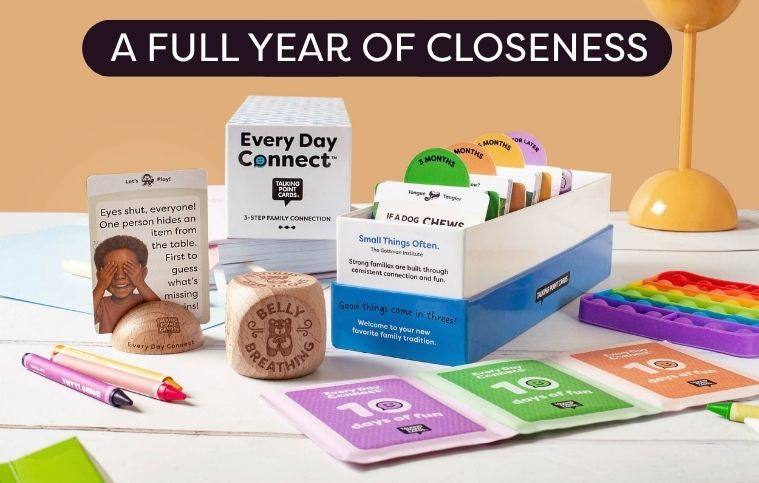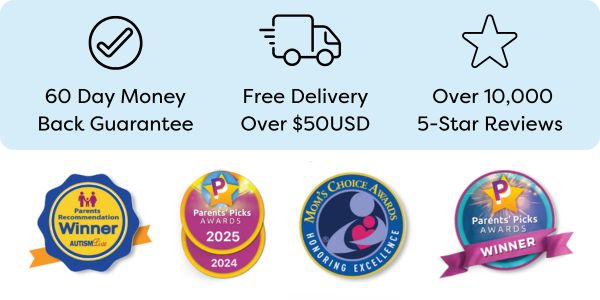SHOP
About
Conversation Cards for Kids
A Tool for Unlocking Meaningful Family Discussions

These days, we're all guilty of being a little too sucked into our screens and devices - kids and adults alike. Whether it's Instagram, video games, or binge-watching the latest hit show, genuine face-to-face conversation is becoming a lost art.
Which is a damn shame, because conversation - real, meaningful conversation - is the currency of understanding each other as human beings. It's how we form deeper bonds, work through disagreements, and learn about those around us. Not just on a surface level, but emotionally.
I love this quote on the importance of conversation from the WordPress founder Matt Mullenweg:
"By having lots of conversations with people, you'll learn an immense amount - whether it's people's hopes, dreams, ambitions, pains, struggles."
Too true. Think about how much you've learned about your closest friends' values, fears, and identities by chatting with them. It's invaluable. And as a parent, those raw moments of conversation with your kids are absolute gold—not just for learning about them, but for modeling healthy communication and teaching them how to express themselves.
The problem is, us busy parents don't always have those moments fall into our laps. Sometimes we need...a little assistance. That's where conversation cards come into play.
The Power of Conversation Starter Cards: A Low-Stakes Way for Kids to Open Up

Conversation starter card decks are becoming a brilliant tool for kickstarting great family discussions. The idea is simple - card has a fun, thought-provoking "prompt" designed to spark open-ended conversation. Some examples:
-
Would you rather be able to talk to animals or speak every language?
-
What's the most amazing place you've ever visited?
-
If you could have any superpower, what would it be and why?
-
If you could switch lives with anyone for a day, who would you pick?
Those are just a few examples, but you can imagine how the responses could open some pretty hilarious and insightful dialogue between kids and parents. At first, your kids might not be eager to participate - but once you get a few exchanges going, their creativity and openness kicks into gear. It can lead to learning some really fascinating stuff about each other and bonding over shared laughter and stories.
The genius thing about using hypothetical prompts is that it gives kids a low-stakes way to practice verbalizing their thoughts in an unintimidating context. Answering silly "what if" questions requires them to tap into their imagination and explain their reasoning - but in a completely low-pressure, consequence-free environment.
As parents, we all know how difficult it can often be to get kids to open up about stuff going on in their "real" lives, whether that's issues at school, experiences, dreams, or complex emotions like sadness or anxiety. There's often a lot of hesitation and resistance. ("I dunno...nothing's wrong...it's fine."). But by using prompts based in fantasy and imagination, kids get comfortable articulating and discussing abstract concepts like:
-
Preferences and opinions ("I'd rather be able to speak to animals because...")
-
Hopes, goals, and aspirations ("My dream superpower would be x because...")
-
Exploring ethical dilemmas ("I'd switch lives with my teacher so I could give the class fun homework...")
-
Self-reflection ("The most amazing place was...because it made me feel...")
Sure, the topics themselves might be hypothetical - but kids are still flexing crucial life muscles: Critical thinking, empathy, self-awareness, consideration of different perspectives.
And they're doing it through low-stakes dialogue and storytelling in a judgement-free environment.
Over time, engaging with these types of exercises makes kids much more capable of effectively communicating in real-life situations. They gain vital practice in organizing their thoughts, explaining their reasoning, and staying present in a back-and-forth discussion. It's like a warm up for more serious future conversations about things like peer conflicts, moral dilemmas they face, or complex emotions.
Even more importantly, hypothetical scenarios give kids a safe space to project their unconscious thoughts, feelings, and mindsets without directly stating "I feel anxious" or "I'm struggling with this issue". They can couch it in the imaginary context, almost like a psychological mask to take the intimidation factor away. From there, thoughtful parents can make insightful connections and create natural openings to address the real root topics underlying their hypothetical responses.

More Than Just Fun: The Immense Benefits of Fostering Communication Skills Early
Beyond enabling kids to casually flex their self-expression abilities, developing strong communication and sharing skills provides an endless list of benefits that reach into adulthood. Socially, it helps them create deeper friendships by learning to open up and listen actively.
In their future careers, clearly conveying information and collaborating will be indispensable skills. Kids who can articulate thoughts/feelings also tend to have higher self-confidence, self-awareness, and emotional intelligence. They're better able to understand their emotions, empathize with others, and develop into happier, more grounded individuals.
Perhaps most importantly, open communication helps kids contextualize, label, and share their internal experiences in a healthy way. When they can discuss thoughts, struggles, and feelings freely—it provides a pressure release valve and coping mechanism. Kids who can't properly "tell their story" often become at risk for behavior issues, developmental problems, and even mental health struggles.
How to Get the Maximum Bonding Value and Learning from Family Conversation Cards

Using hypothetical conversation prompts is such a clever way to get kids engaged while weaving in vital communication practice. But to really maximize their usefulness as a tool for family bonding and growth, it's wise to follow a few best practices:
Make it a Ritual and Event
Humans thrive on routines and rituals - it's how we form lasting habits. So while spontaneous chats are great, try designating a weekly "family conversation night" or doing cards as a pre-dinner tradition. Give it an official timeslot and prior anticipation. Kids will love the consistency.
Set the Tone
Before starting, set some lighthearted ground rules and reminders: Share thoughtfully, listen actively, keep an open mind, don't judge, be respectful. You may need to reiterate these for kids. Consider having one person model an over-the-top dramatic response first to showcase vulnerability and loosen things up.
Let the Cards Be a Launchpad
Don't just go card > response > card. Use the prompts as jumping off points into more profound discussions and storytelling. Ask follow up questions. Share personal examples and antidotes. Get the whole family's perspectives, piggyback off each other's musings. Untapped potential exists if you get the dialogue really flowing!
Create an Ideal Environment
The vibe matters. Do it in a cozy, relaxing space that feels informal and safe, whether that's circled up on the living room floor, at the kitchen table over dessert, or even outside in the backyard. Ensure everyone is comfortable and not too tired or hungry (looking at you, Dad). Car rides could work in a pinch but probably isn't ideal.
Up the Engagement Factor
Don't treat is as Q&A homework - get creative and gamify these card nights! Turn some into roleplaying scenarios, drawing contests, or see if you can spark hilarious riffs and improvisational humor based on the prompts. Make snacks/treats part of the experience. See if you can go so off the rails...that you almost forget about the cards entirely!
Customize and Make it Your Own
Many card decks come with blank cards. Use them to create your own family inside jokes and prompts tailored to your unique personalities and experiences. Or DIY the whole deck via free printable templates found online. When you customize the content, that's when the real magic happens.
If you approach conversation cards as not just a Q&A activity but as a fully-fledged, customized experience - that's when you unlock their maximum potential as a bonding tool.

The Immense Power of Simply Talking
At the end of the day, these prompts are simply facilitators and catalysts for good old fashioned in-person dialogue. Which is sadly becoming rarer and rarer—a fact that should scare all of us.
At the end of the day, these prompts are simply facilitators and catalysts for good old fashioned in-person dialogue. Which is sadly becoming rarer and rarer - a fact that should scare all of us.
Sure, the hypothetical "would you rather..." prompts might seem silly on the surface. But the real magic is how they grease the conversational wheels for something much deeper to happen - an authentic connection and transfer of identity between family members. Think about how much of your own worldview, beliefs, and inner self has been transmitted through face-to-face stories, jokes, musings, and meandering chats. We are fundamentally shaped by the conversations we have.
So when you gather the family around to engage with these prompts - you're doing much more than just entertaining your kids for an evening. You're providing a structured excuse to:
-
Slow down from our frantic, digital paces
-
Practice the art of focused listening without devices
-
Share uninterrupted quality time together
-
Vocalize our imaginations, dreams, and identities
-
Model open vulnerability and confidence in expressing ourselves
-
Learn about each other's hearts and minds through laughter and stories
-
Create priceless memory-holding vessels to be cherished forever
No Snapchat streak, video game achievement or binge session can ever replicate the intimacy and connections forged during those rich family dialogue sessions. It's utterly irreplaceable.
So load up on some silly hypothetical cards and start your own cherished tradition - where your living room becomes a sacred space for hilarious, weird, poignant, funny, surprising heart-to-heart chats. Where the deepest bonds get reinforced through a permission to imagine, pretend, and relate to each other on a level that transcends our daily distractions.
Because at the end of the day, that intimate conversation is one of the most precious gifts we can give to both our kids and ourselves. The shared laughter, vulnerability, eye contact, undivided presence - it all stays with us as indelible heart-holding memories.
So let's all pledge to talk more, put down our phones, and embrace the gloriously inexact journey of simply relating to one another, voice to voice, with the same curiosity and presence we've been graced with since the days of roaming storytellers.
LIKED THIS ARTICLE?
SIGN UP FOR MORE!






